Physical Address
304 North Cardinal St.
Dorchester Center, MA 02124
Physical Address
304 North Cardinal St.
Dorchester Center, MA 02124
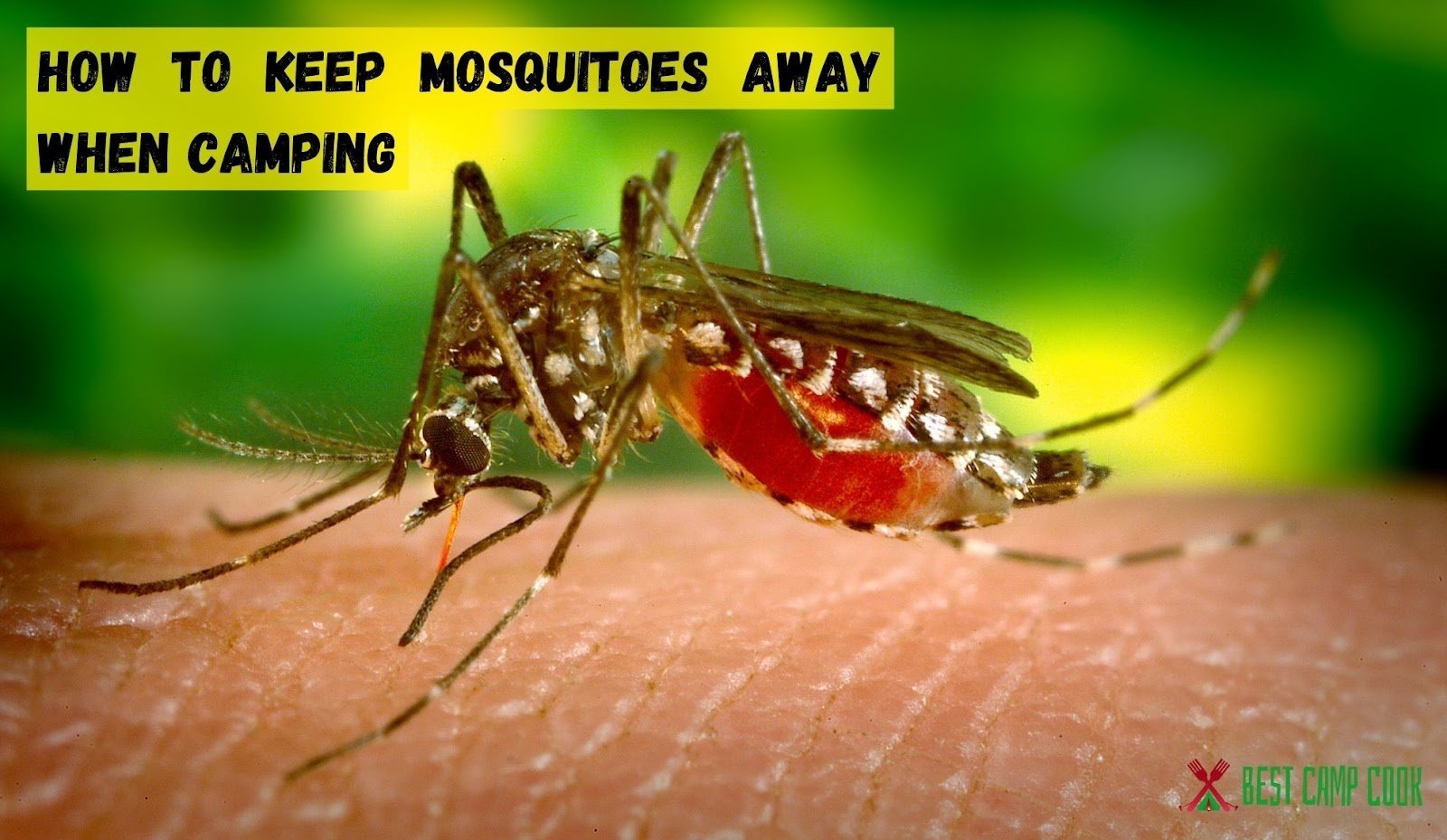
Looking for how to keep mosquitoes away when camping? Well, you’re in luck! In this concise and informative guide, we’ll reveal the secrets to enjoying a mosquito-free camping experience. No more annoying buzzing or itchy mosquito bites to ruin your outdoor adventures.
With our expert tips and tricks, you’ll learn how to keep those pesky insects at bay and reclaim your camping bliss. From understanding mosquito behavior to choosing the right repellents, we’ve got you covered.
So, get ready to gear up, pitch your tent, and say goodbye to those unwelcome buzzing companions. Let’s explore the world of “How to keep mosquitoes away when camping” and make your outdoor escapades truly unforgettable!
Main Summary: How to Keep Mosquitoes Away When Camping?
To keep mosquitoes away when camping, use insect repellents containing DEET, wear protective clothing, set up mosquito nets around sleeping areas, and avoid stagnant water. Opt for elevated and windy campsites, and consider citronella candles.
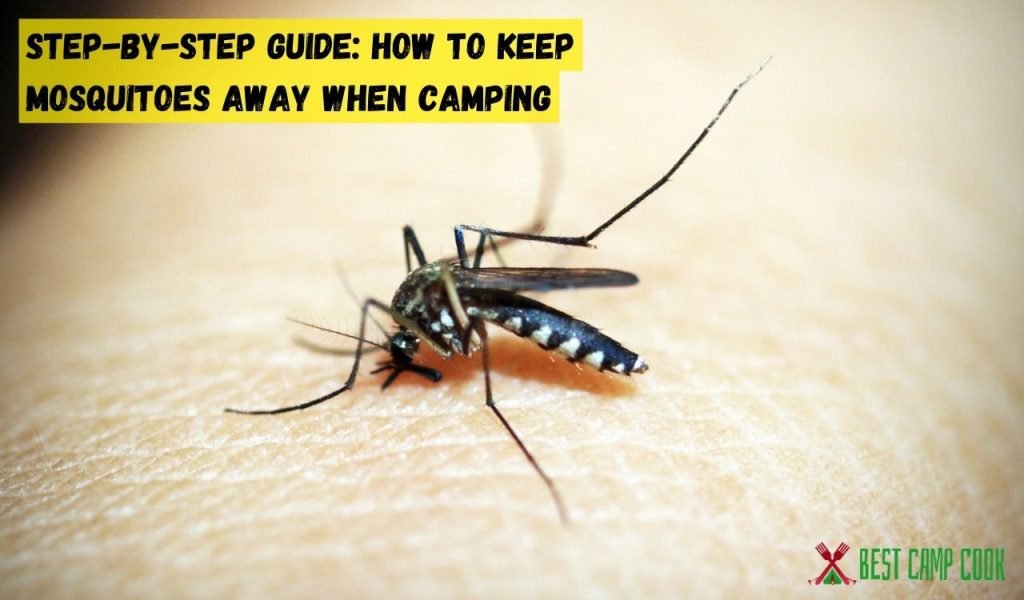
When it comes to keeping mosquitoes away during your camping adventure, understanding their behavior is a crucial step. By gaining insights into how these pesky insects operate, you can develop effective strategies to deter them from disrupting your outdoor experience. Here are some key points to consider:
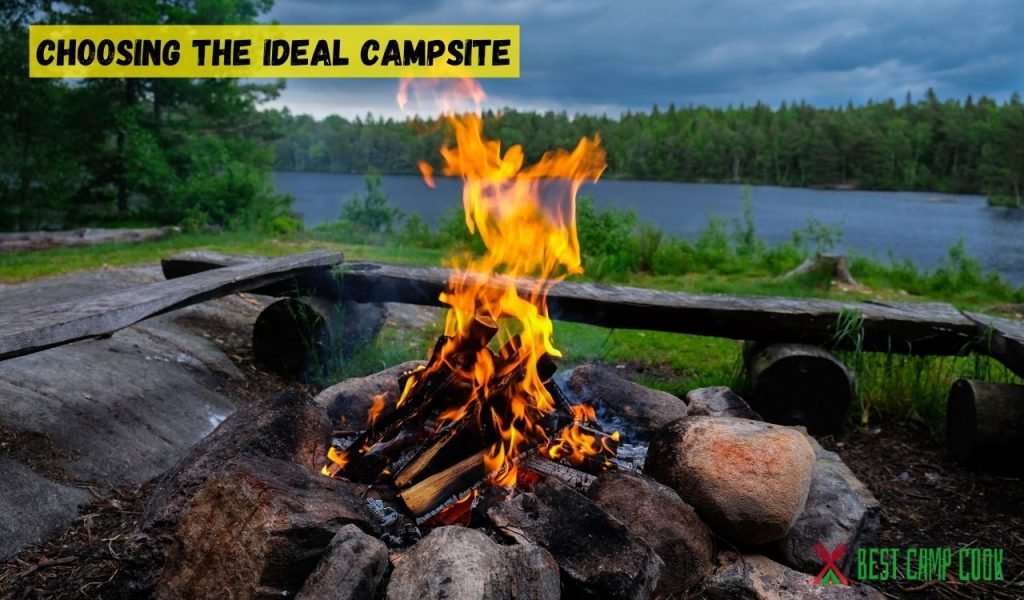
When planning a camping trip, selecting the right campsite plays a vital role in minimizing mosquito encounters and ensuring a pleasant outdoor experience. By considering specific factors and adopting a strategic approach, you can greatly reduce the mosquito population in your camping area. Here are some detailed points to guide you in choosing the ideal campsite:
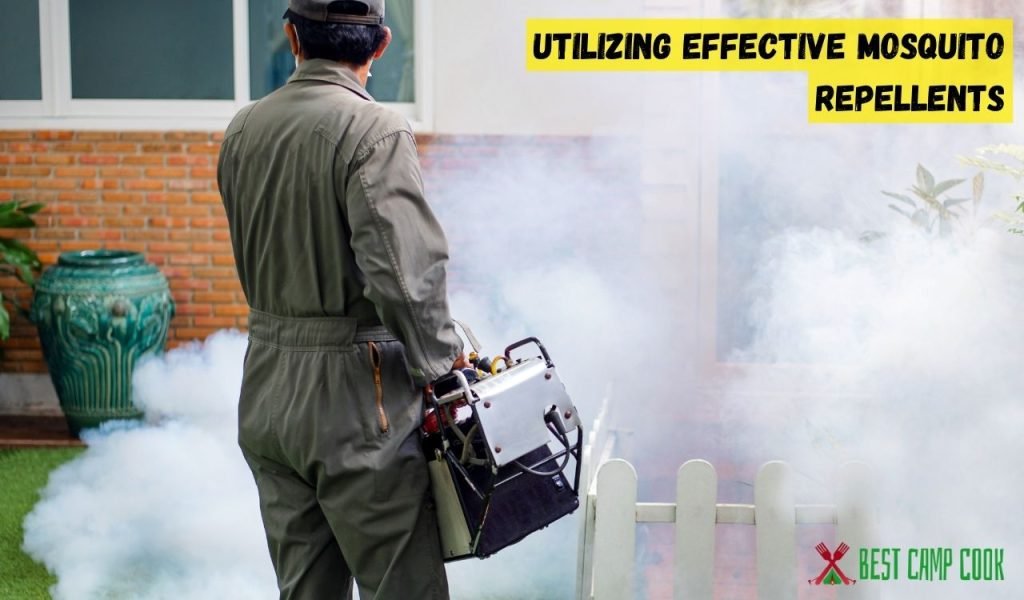
When venturing into the great outdoors, it’s crucial to arm yourself with effective mosquito repellents to protect against these pesky insects. By choosing the right repellents and employing smart application techniques, you can significantly reduce the chances of mosquito bites and enjoy your camping experience to the fullest. Here are some detailed points to help you make the most of mosquito repellents:
Proper Application Techniques: To maximize the effectiveness of mosquito repellents, it’s important to apply them correctly. Follow these tips:
Protective Clothing: Alongside repellents, wearing protective clothing can significantly reduce mosquito bites. Opt for loose-fitting, long-sleeved shirts, long pants, and socks to cover exposed skin.
Tuck pants into socks and choose light-colored clothing, as mosquitoes are often attracted to dark colors. Consider using head nets or hats with built-in mosquito netting to protect your face and neck.
Campsite Preparation: To create a more mosquito-proof campsite, utilize additional protective measures:
Taking proactive measures to create a mosquito-proof campsite is crucial for a peaceful night’s sleep. Here are some effective strategies:
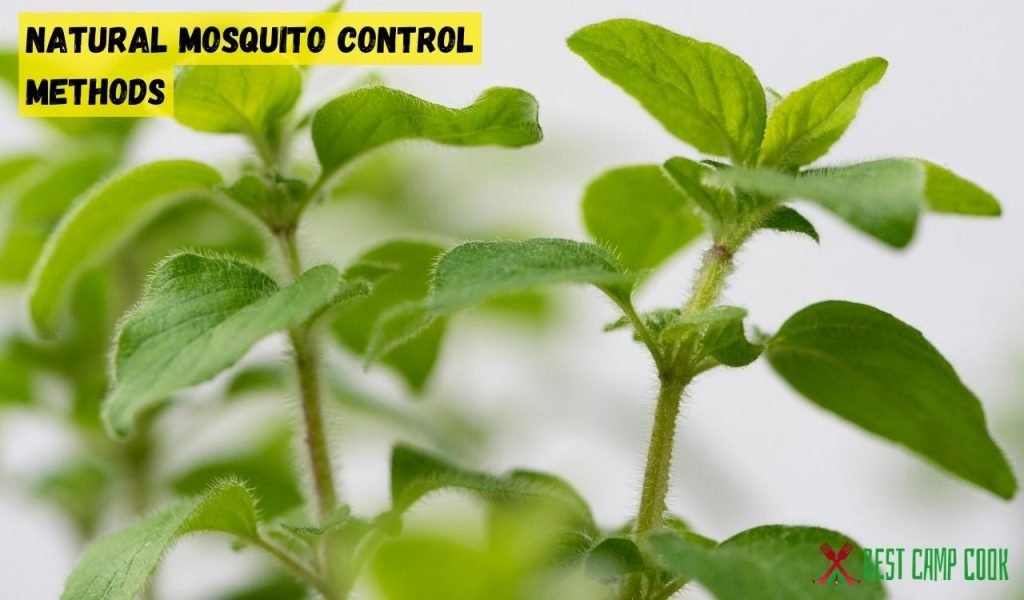
Mosquitoes can quickly turn a pleasant camping trip into an itchy nightmare. However, with the right knowledge and natural mosquito control methods, you can keep these pesky insects at bay and enjoy your outdoor adventure to the fullest. In this article, we will delve into a variety of effective techniques that will help you ward off mosquitoes naturally, ensuring a comfortable and bug-free camping experience.
To effectively control mosquitoes, it’s crucial to understand their behavior and habits. Female mosquitoes require stagnant water to lay their eggs and complete their life cycle. Therefore, eliminating potential breeding sites around your campsite is paramount. Be vigilant in removing or treating any standing water sources such as birdbaths, puddles, or water containers. By denying mosquitoes their preferred breeding grounds, you can significantly reduce their population in the area.
Nature provides its own arsenal against mosquitoes through natural predators that feed on them. Consider attracting these beneficial insects to your campsite to help control the mosquito population. Dragonflies, for example, are voracious mosquito predators.
Creating a favorable environment for dragonflies, such as having a small pond or water feature nearby, can encourage their presence and keep mosquito numbers in check. Similarly, bats and certain bird species feed on mosquitoes, so preserving their habitats can contribute to natural mosquito control.
Certain plants possess natural mosquito-repelling properties and can serve as a valuable addition to your camping arsenal. Incorporating these plants into your campsite landscape can help deter mosquitoes. Citronella, a popular choice, emits a distinct aroma that repels mosquitoes.
Planting citronella grass or using citronella candles can create a protective barrier against these pests. Other effective mosquito-repelling plants include lavender, lemongrass, marigolds, and basil. These plants not only add beauty to your campsite but also act as natural repellents.
Harness the power of essential oils to ward off mosquitoes naturally. Many essential oils possess mosquito-repelling properties, making them excellent alternatives to chemical-based repellents.
Citronella oil, eucalyptus oil, and lemon eucalyptus oil are well-known for their effectiveness against mosquitoes. Dilute these oils with a carrier oil such as coconut oil and apply them to exposed areas of your skin.
Alternatively, you can create a homemade mosquito repellent spray by combining essential oils, water, and a natural emulsifier like witch hazel.
Making a few modifications to your campsite can significantly reduce mosquito activity and make your camping experience more enjoyable. Start by choosing a camping location away from standing water sources, dense vegetation, or areas known for high mosquito populations. Mosquitoes are less likely to bother you if you set up camp in open, breezy areas.
Additionally, create physical barriers to keep mosquitoes out of your camping area. Use mosquito nets to cover sleeping areas, including tents or hammocks, and ensure they are properly sealed. Installing mesh screens on windows and doors can also prevent mosquitoes from entering enclosed spaces.
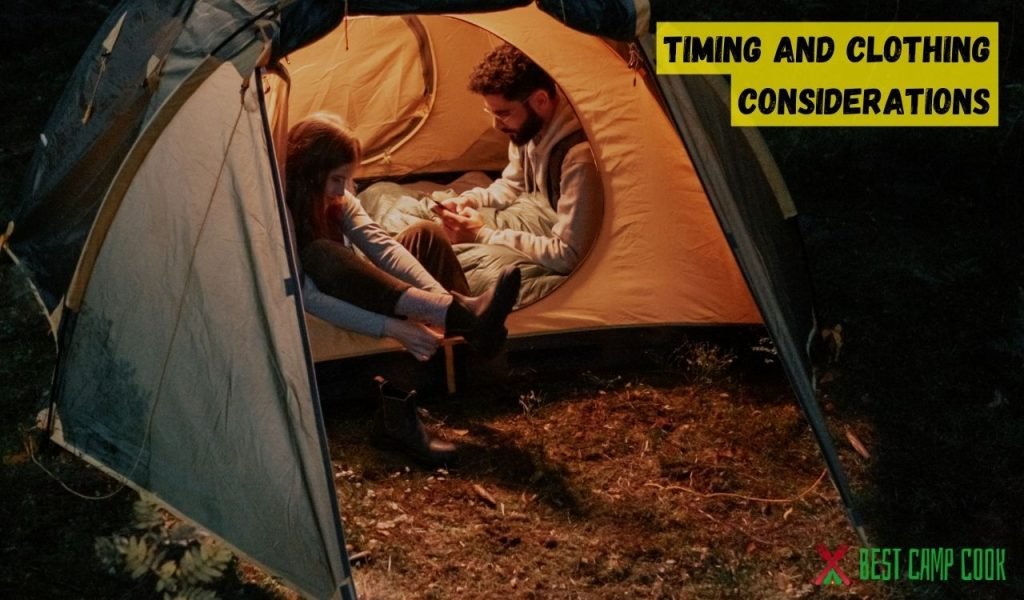
When it comes to keeping mosquitoes away during your camping adventure, understanding their behavior and making strategic choices regarding timing and clothing can play a vital role.
By being aware of the times when mosquitoes are most active and selecting the right clothing, you can minimize your exposure and enjoy your camping experience without the annoying buzz and itchy bites. Let’s explore some key considerations to outsmart mosquitoes effectively.
Mosquitoes are most active during specific times of the day, primarily at dawn and dusk. These periods coincide with their feeding times, as they are most active when searching for a blood meal. To avoid peak mosquito activity, plan your outdoor activities accordingly.
Schedule hikes, fishing trips, or other excursions during midday or early afternoon when mosquitoes are less likely to bother you. By adjusting your plans to avoid the peak mosquito hours, you can significantly reduce the risk of mosquito bites.
One of the simplest yet effective ways to protect yourself from mosquito bites is by wearing the right clothing. Mosquitoes are drawn to dark colors, especially black and navy blue, as they provide a visual contrast.
To minimize their attraction, opt for light-colored clothing, such as pastels or whites, which are less appealing to mosquitoes. Light-colored clothes also help you spot mosquitoes more easily, making it easier to swat them away.
Besides color, the type of clothing and coverage it provides are important factors. Long-sleeved shirts, long pants, and socks are essential to minimize exposed skin. Loose-fitting clothing is preferable, as mosquitoes can bite through tight fabrics.
Tucking your pants into your socks creates an extra barrier, preventing mosquitoes from reaching your skin. Additionally, choose clothing made of tightly woven fabrics, as they provide better protection compared to thin, loosely woven materials.
For added protection against mosquitoes, consider investing in insect-repellent clothing. These garments are specifically designed to repel mosquitoes and other biting insects. They are treated with insecticides, such as permethrin, which repel and kill mosquitoes upon contact.
Insect-repellent clothing is available in various styles and can be found in outdoor stores or online. Wearing such clothing can significantly enhance your defense against mosquitoes, especially in areas with high mosquito activity.
In addition to appropriate clothing, applying mosquito repellents to exposed skin can provide an extra layer of protection. Look for mosquito repellents containing DEET, picaridin, or lemon eucalyptus oil, as these ingredients have been proven effective against mosquitoes.
Apply the repellent evenly to all exposed areas, following the instructions on the product label. Avoid applying repellent to open wounds, cuts, or irritated skin. Remember to reapply the repellent as directed, especially after swimming or excessive sweating.
While timing and clothing are crucial, there are a few more considerations to keep in mind for a mosquito-free camping experience:
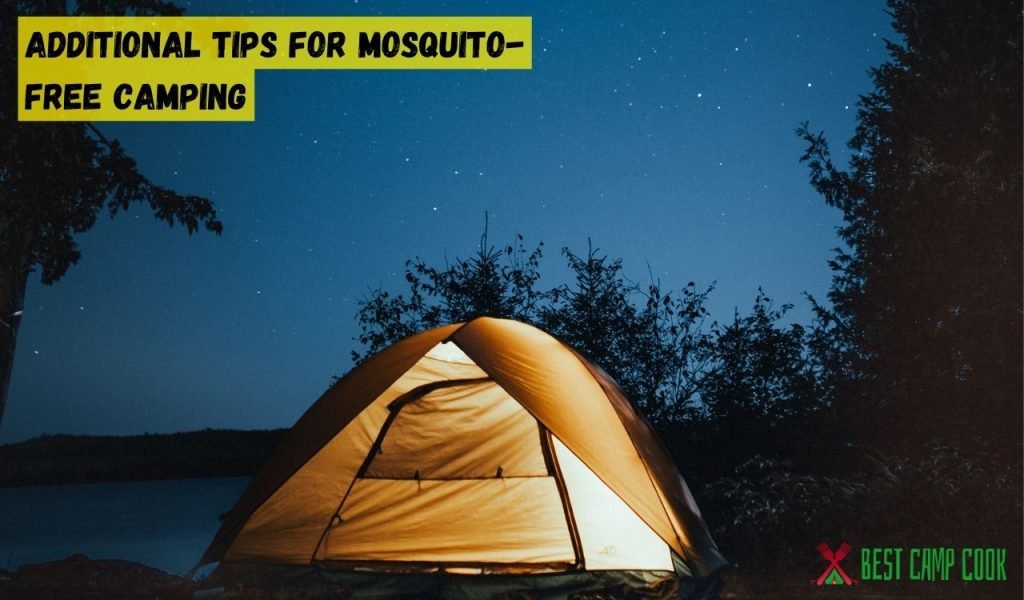
When it comes to camping, mosquitoes can be a constant annoyance. To ensure a mosquito-free experience and make the most of your outdoor adventure, here are some additional tips to consider:
Selecting the right campsite can make a significant difference in your battle against mosquitoes. Look for a location that is away from standing water sources like ponds or marshes, as these are breeding grounds for mosquitoes.
Instead, opt for higher ground or areas with good air circulation. Additionally, consider campsites with a breeze or near natural mosquito repellent plants like citronella or lemongrass. These strategic choices can help reduce the mosquito population around your camping area.
Mosquitoes are attracted to odors, so keeping your campsite clean and free of food scraps and trash is essential. Dispose of garbage in tightly sealed containers and ensure your cooking area is clean.
This helps minimize the scents that can attract mosquitoes and other pests. Also, avoid leaving stagnant water around your campsite, as it creates an ideal breeding environment for mosquitoes. Empty and cover any containers, such as buckets or coolers, that may collect water.
Citronella is a natural mosquito repellent that can help create a mosquito-free zone around your campsite. Consider using citronella candles or torches to ward off mosquitoes.
These can be placed strategically around your camping area to create a protective barrier. The strong scent of citronella masks the odors that attract mosquitoes, making it harder for them to find you. Plus, the soft glow of the candles or torches adds a cozy ambiance to your camping experience.
Mosquito traps are another effective tool to reduce the mosquito population around your campsite. These traps use various methods to attract and capture mosquitoes. Some traps emit carbon dioxide, imitating human breath, while others use light or special scents to lure mosquitoes.
Setting up a mosquito trap away from your camping area can help draw the insects away and keep them from bothering you. Research different types of mosquito traps available and choose one that suits your needs.
Nature provides us with various plants that naturally repel mosquitoes. Consider planting or placing these mosquito-repellent plants around your campsite. Some common examples include lavender, rosemary, mint, and marigold. These plants emit fragrances that mosquitoes find unpleasant, keeping them at bay.
You can also rub the leaves on your skin for added protection. Incorporating these plants into your camping environment not only helps repel mosquitoes but also adds beauty and freshness to your surroundings.
Mosquitoes are attracted to stagnant targets. When you’re active and constantly moving, you become a less appealing target. Engage in outdoor activities like hiking, biking, or playing games to keep mosquitoes at bay.
Additionally, the breeze generated by movement makes it harder for mosquitoes to fly and land on you. Another great way to stay active and refreshed while camping is to take a shower. Find a nearby water source or set up a portable camping shower, and enjoy a refreshing rinse. Not only will this help you stay clean and comfortable, but it will also wash away any scents that may attract mosquitoes.
In addition to commercial mosquito repellents, some natural remedies can help keep mosquitoes away. For example, applying essential oils like lemon eucalyptus, lavender, or tea tree oil to your skin can act as a natural repellent. You can also create a DIY mosquito repellent spray using a combination of these oils diluted in a carrier oil or water.
Be sure to test a small area of your skin for any allergic reactions before applying these remedies. Natural remedies can provide an extra layer of protection against mosquitoes without the use of chemicals.
When camping in mosquito-prone areas, wearing protective clothing can make a significant difference. Opt for long-sleeved shirts, long pants, and socks to cover exposed areas of your body. Mosquitoes are less likely to bite through thick clothing, providing you with an extra barrier of protection.
Additionally, choose light-colored clothing as mosquitoes are attracted to dark colors. Consider treating your clothing with permethrin, an insect repellent that can be applied to fabric, for added defense against mosquitoes.
If you’re camping in an area with a high mosquito population, using mosquito nets can be a lifesaver. Ensure your tent has proper mesh netting to prevent mosquitoes from entering. You can also use individual mosquito nets for sleeping bags or hammocks.
Hanging a mosquito net around your sleeping area creates a physical barrier between you and the mosquitoes, allowing for a peaceful and undisturbed night’s sleep.
Different regions and seasons have varying levels of mosquito activity. Stay informed about the peak mosquito season in your camping area. Mosquitoes are most active during dawn and dusk, so plan your outdoor activities accordingly.
Consider scheduling hikes or other adventures during the daytime when mosquitoes are less prevalent. By being aware of the timing of their activity, you can minimize your exposure and maximize your enjoyment of the great outdoors.
Keeping mosquitoes away when camping is essential for a comfortable and enjoyable outdoor experience. By employing natural mosquito control methods, understanding mosquito behavior, and taking preventive measures, you can significantly reduce mosquito encounters and bites.
Remember to eliminate standing water, wear appropriate clothing, utilize natural repellents, modify the camping environment, and consider additional tips like campfire smoke, mosquito nets, and fans.
With these strategies in place, you can embark on your camping adventure with confidence, knowing that mosquitoes won’t dampen your spirits. Stay bug-free and happy camping!
The best mosquito repellent for camping is one that contains DEET, picaridin, or oil of lemon eucalyptus (OLE). These ingredients have been proven effective in repelling mosquitoes. Choose a repellent with a higher concentration of active ingredients for longer-lasting protection.
There are several natural ways to repel mosquitoes when camping. You can use essential oils like citronella, lavender, or eucalyptus to create a DIY mosquito repellent spray. Mosquito-repellent plants like lemongrass, mint, and marigold can also be placed around your campsite. Additionally, wearing long-sleeved shirts, pants, and using mosquito nets can provide natural protection.
Yes, camping near water sources such as ponds, lakes, or rivers can attract more mosquitoes. Mosquitoes breed in stagnant water, so it’s advisable to camp away from these areas.
Choose a campsite on higher ground or with good air circulation to reduce the mosquito population around your camping area.
Bug zappers are not the most effective method for repelling mosquitoes while camping. While bug zappers can attract and kill some mosquitoes, they may also attract other insects and create noise and light disturbances in your camping area.
It’s recommended to use mosquito repellents, mosquito nets, and other natural control methods for better protection.
While campfires produce smoke, which can deter mosquitoes to some extent, they are not entirely effective in keeping mosquitoes away. Mosquitoes can still be attracted to the warmth and carbon dioxide emitted by campers.
It’s best to use additional mosquito control methods like repellents and protective clothing along with the campfire.
Mosquito coils and citronella candles can be effective in creating a mosquito-free zone around your campsite. These products release smoke and scents that mosquitoes find unpleasant. Place them strategically around your camping area to create a protective barrier.
However, their effectiveness may vary, and it’s advisable to use other mosquito control methods in conjunction with these products.
The duration of mosquito repellent varies depending on the concentration of active ingredients and environmental factors. Generally, a mosquito repellent with a higher concentration of DEET, picaridin, or OLE provides longer-lasting protection.
Follow the instructions on the product label for reapplication intervals, especially if you’re sweating or swimming, as it can diminish the effectiveness of the repellent.
Yes, several natural remedies can help relieve mosquito bites while camping. Applying a cold compress, aloe vera gel, or calamine lotion to the affected area can soothe itchiness and reduce inflammation.
Natural ingredients like witch hazel, tea tree oil, or baking soda mixed with water can also provide relief. Avoid scratching the bites to prevent further irritation and potential infection.
Camping in windy areas can help reduce mosquito encounters to some extent. Mosquitoes are not strong fliers, and the wind can make it more challenging for them to fly and land on you. However, it’s important to note that mosquitoes can still be present in sheltered areas or during calm periods. It’s best to combine windy camping locations with other mosquito control measures.
Mosquitoes are attracted to certain scents, including perfumes, scented lotions, and fragrant soaps. To minimize attracting mosquitoes, it’s advisable to avoid heavily scented products when camping. Opt for unscented or mosquito-repellent personal care products to reduce the likelihood of mosquito bites.